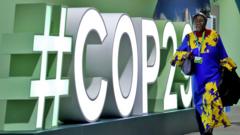In the wake of recent catastrophic floods in Valencia, Spain, explicitly worsened by climate change, former UN Secretary General Ban-Ki Moon and other experts have raised alarms about the state of the UN's COP climate negotiations, declaring that they are "no longer fit for purpose." In a letter to the UN, they emphasized the urgency for reform, particularly discouraging nations from hosting the talks if they do not fully endorse transitioning away from fossil fuels.
At COP29 in Azerbaijan, President Ilham Aliyev promoted natural gas as a "gift from God," signaling a stark contradiction with the goals of the climate talks, where the focus should be on reducing fossil fuel reliance. This came in light of troubling revelations, including an Azerbaijan official allegedly leveraging their role at COP for potential fossil fuel agreements.
Despite strides made in the past, such as the Paris Climate Agreement's commitment to limit global temperature rise to 1.5C, the pace of change is deemed alarmingly inadequate. Emissions have recently increased, with experts asserting the urgent need for a 42% reduction by the decade’s end to avert catastrophic climate impacts.
However, some involved in the COP process maintain that the talks are crucial for facilitating global consensus on climate issues. Christiana Figueres, one of the letter's signatories, reaffirmed her commitment to the COP process, countering any misinterpretations of her support for reforms, underscoring its essential role in promoting multilateral climate strategies.
The letter's publication reflects mounting frustrations from smaller nations, particularly those vulnerable to climate change, like small island states, which fear being sidelined in discussions dominated by larger, developed countries. Additionally, there are rising concerns about the selection of host countries for COP meetings, particularly those reliant on fossil fuel production, as such choices may undermine the integrity of climate commitments.
Calls for change include more frequent COP meetings accompanied by stringent accountability measures, ensuring all countries contribute meaningfully to the global effort against climate change, paving the way for a more effective and equitable approach to mitigating rising temperatures.
At COP29 in Azerbaijan, President Ilham Aliyev promoted natural gas as a "gift from God," signaling a stark contradiction with the goals of the climate talks, where the focus should be on reducing fossil fuel reliance. This came in light of troubling revelations, including an Azerbaijan official allegedly leveraging their role at COP for potential fossil fuel agreements.
Despite strides made in the past, such as the Paris Climate Agreement's commitment to limit global temperature rise to 1.5C, the pace of change is deemed alarmingly inadequate. Emissions have recently increased, with experts asserting the urgent need for a 42% reduction by the decade’s end to avert catastrophic climate impacts.
However, some involved in the COP process maintain that the talks are crucial for facilitating global consensus on climate issues. Christiana Figueres, one of the letter's signatories, reaffirmed her commitment to the COP process, countering any misinterpretations of her support for reforms, underscoring its essential role in promoting multilateral climate strategies.
The letter's publication reflects mounting frustrations from smaller nations, particularly those vulnerable to climate change, like small island states, which fear being sidelined in discussions dominated by larger, developed countries. Additionally, there are rising concerns about the selection of host countries for COP meetings, particularly those reliant on fossil fuel production, as such choices may undermine the integrity of climate commitments.
Calls for change include more frequent COP meetings accompanied by stringent accountability measures, ensuring all countries contribute meaningfully to the global effort against climate change, paving the way for a more effective and equitable approach to mitigating rising temperatures.





















